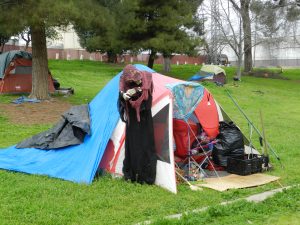
Two of the most common claims about people experiencing homelessness are, “They don’t want help,” and, “They don’t want to work.” Both assertions make it easy to dismiss homelessness as a matter of choice, but neither accounts for the stark realities of an unfair economy.
When Governor Jerry Brown signed legislation that will increase the minimum wage to $15 per hour by 2022 on April 5, local politicians argued it would ruin the Valley economy. But as Bruce Frohman noted in a recent article, our unemployment figures are already double the state average.
We also have at least 20,000 Stanislaus County residents in imminent danger of homelessness. As of February of this year, average rent for a one-bedroom apartment in Modesto was $826 a month. At today’s minimum wage of $10/hr, it would take well over half a worker’s net income to pay average rent.
Factor in transportation costs—vehicle, gas, insurance, registration—and it becomes a challenge to pay for food, clothing, health care, and other necessities. The challenge is especially daunting for homeless people without incomes, because they almost always have no assets at all when trying to find shelter.
So if one needs a first and last month’s rent, and a cleaning deposit as well, a minimum wage earner would have to work well over six weeks just to begin thinking about finding long-term shelter. Transportation? Bus service is an option, but even that adds fixed expenses to an already burdened minimum wage budget. A car is simply out of the question, unless a person can somehow skimp on food and other necessities.
For decades, pundits and politicians have extolled “family values” such as hard work and thrift as the keys to escaping poverty. But in, “Struggling to Get By,” a recent study by United Way, researchers found that even two full-time workers at minimum wage can’t support a family of four.
In a region with high unemployment figures, homeless people are far less likely to be hired than other applicants. They are also much more likely to lack high school educations and employable skills.
Though many have tried working and failed, few ever hear terms like “affordable housing” and “living wage.” Instead, their failures are internalized as character flaws.
And while it’s true that a large percentage of homeless people use drugs, drug use is tolerated and even excused among people with sufficient incomes to afford housing. Nationwide, death rates among middle-aged white Americans are soaring to all-time highs, the, “result of problems with legal and illegal drugs, alcohol-related liver disease, and suicide.” Pointing the finger to drug use by homeless people ignores a growing national malaise many attribute to an economy that has abandoned the American middle class.
It’s often said the minimum wage is for entry-level jobs and people need to work their way up to higher incomes. But in a country that has for decades ignored economic development in favor of outsourcing and overseas labor, working your way up has become a cruel fiction for far too many people. Why work when your labor no longer yields the rewards of family, food, and shelter?
The cruelty is compounded in a region long known as “the Appalachia of the West.” When our political leaders recoil in horror at the thought of paying a living wage even while the region’s prime economic engine of agriculture rakes in record-setting profits, it’s time to take a critical look at our business model. An economy that rewards the few at the expense of the many violates long-held American principles of opportunity and equality.

Good piece. For anything to improve for them, they need a safe place to be and decent food. Bread is poisen. And forced religion is cultist. Even if most of these people were to have economic opportunities, they are so beat down that they require labor rehabilitation along with other specific needs. The best goal right now, in terms of pragmatic priorities, is simply this: they need a safe place to be and a heathier diet.
Amazing piece. Merced county also has a huge homeless rate, and also in dire need of help with its economic situation. I appreciate this article.
Thank you Gabriel. More to come.